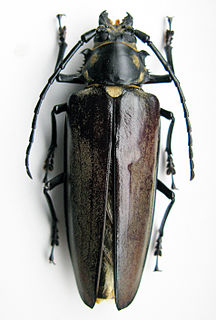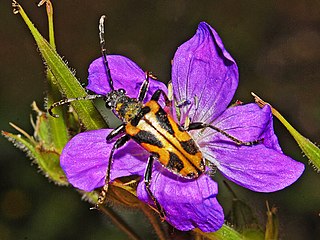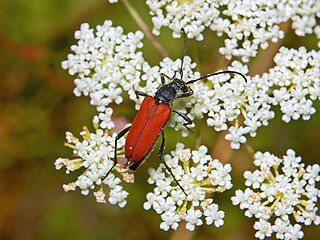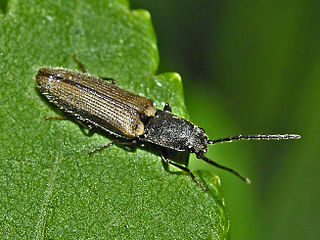
Hylotrupes is a monotypic genus of woodboring beetles in the family Cerambycidae, the longhorn beetles. The sole species, Hylotrupes bajulus, is known by several common names, including house longhorn beetle, old house borer, and European house borer. It is the only genus in the tribe Hylotrupini.

The banded alder borer, Rosalia funebris, is a member of the very diverse family of longhorn beetles.

Callipogon relictus is a species of longhorn beetle which is mostly found in Korea, but also in China and southern part of Russian Far East. It inhabits mixed and deciduous forests. The population of Callipogon relictus is decreasing due to deforestation and uncontrolled collection, and therefore the species are listed in the Russian Red Book.

Brachyta interrogationis is the species of the Lepturinae subfamily in long-horned beetle family. This species was described in 1758 by Carl Linnaeus in the 10th edition of Systema Naturae under the name Leptura interrogationis.

Dinoptera collaris is the species of the Lepturinae subfamily in long-horned beetle family.

Arima marginata is a species of leaf beetles of the subfamily Galerucinae in the family Chrysomelidae.

Anastrangalia sanguinolenta is a species of flower longhorn beetles belonging to the family Cerambycidae, subfamily Lepturinae.

Chlorophorus sartor is a species of round-necked longhorns of the family Cerambycidae, subfamily Cerambycinae.

Clytus rhamni is a species of round-necked longhorns belonging to the family Cerambycidae, subfamily Cerambycinae.

Pachytodes cerambyciformis is a species of beetle belonging to the family Cerambycidae, subfamily Lepturinae.

Stenopterus rufus is a beetle species of round-necked longhorns belonging to the family Cerambycidae, subfamily Cerambycinae.

Stenurella melanura is a flower longhorn beetle species of the family Cerambycidae, subfamily Lepturinae.

Anastrangalia dubia is a species of beetle of family Cerambycidae.

Stenurella bifasciata is a species of beetle in the family Cerambycidae.

Athous bicolor is a species of click beetles.

Oberea pupillata is a species of beetle in the family Cerambycidae. It was described by Leonard Gyllenhaal in 1817, originally under the genus Saperda.

Cerambyx welensii is a species of beetle in the family Cerambycidae.

Elater ferrugineus, the rusty click beetle, is a species of click beetle belonging to the family Elateridae.

Mylabris variabilis is a species of blister beetle belonging to the Meloidae family.

Chlorophorus figuratus is a species of round-necked longhorns belonging to the family Cerambycidae, subfamily Cerambycinae.
























